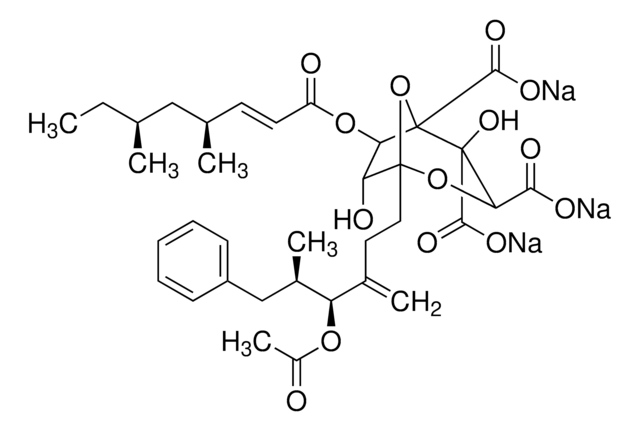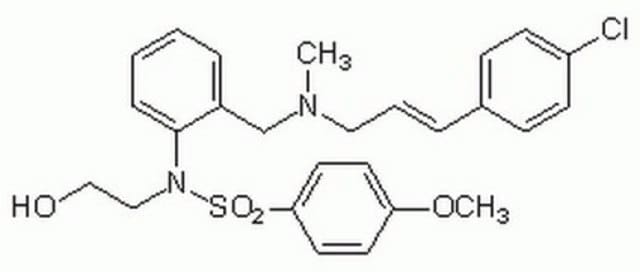SML2168
TAK-475
≥98% (HPLC)
Synonym(s):
1-[2-[(3R,5S)-1-[3-(Acetyloxy)-2,2-dimethylpropyl]-7-chloro-5-(2,3-dimethoxyphenyl)-1,2,3,5-tetrahydro-2-oxo-4,1-benzoxazepin-3-yl]acetyl]-4-piperidineacetic acid, Lapaquistat acetate, TAK 475
About This Item
Recommended Products
Assay
≥98% (HPLC)
form
powder
color
white to beige
solubility
DMSO: 2 mg/mL, clear
storage temp.
−20°C
SMILES string
O=C1[C@@H](CC(N2CCC(CC(O)=O)CC2)=O)O[C@H](C3=CC=CC(OC)=C3OC)C4=C(C=CC(Cl)=C4)N1CC(C)(C)COC(C)=O
InChI
1S/C33H41ClN2O9/c1-20(37)44-19-33(2,3)18-36-25-10-9-22(34)16-24(25)30(23-7-6-8-26(42-4)31(23)43-5)45-27(32(36)41)17-28(38)35-13-11-21(12-14-35)15-29(39)40/h6-10,16,21,27,30H,11-15,17-19H2,1-5H3,(H,39,40)/t27-,30-/m1/s1
InChI key
CMLUGNQVANVZHY-POURPWNDSA-N
Application
- as a farnesyl-diphosphate farnesyltransferase 1 (FDFT1) inhibitor to study its effects on cell signaling in pancreatic ductal adenocarcinoma cells
- as a squalene synthase (SQS) inhibitor to stabilize HMG-CoA reductase (HMGCR)-dCat-ELuc proteins
- as an SQS inhibitor to study its effects on the migration of prostate cancer cells
Biochem/physiol Actions
Storage Class Code
11 - Combustible Solids
WGK
WGK 3
Flash Point(F)
Not applicable
Flash Point(C)
Not applicable
Choose from one of the most recent versions:
Certificates of Analysis (COA)
Don't see the Right Version?
If you require a particular version, you can look up a specific certificate by the Lot or Batch number.
Already Own This Product?
Find documentation for the products that you have recently purchased in the Document Library.
Our team of scientists has experience in all areas of research including Life Science, Material Science, Chemical Synthesis, Chromatography, Analytical and many others.
Contact Technical Service








